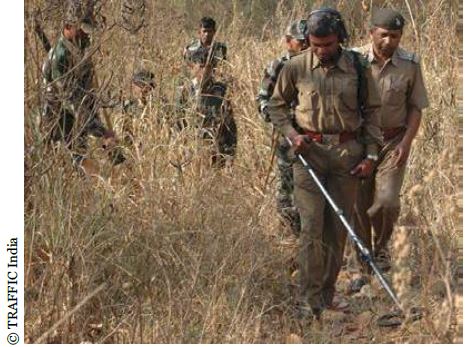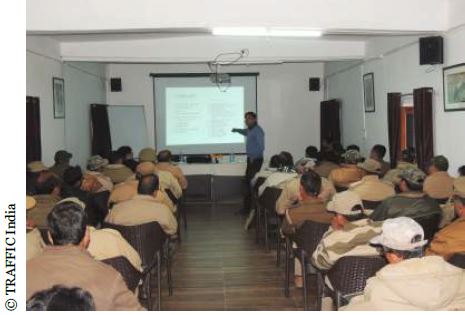
seized from 2000 to 2018 across 32 countries and territories globally.

killed each year globally.

are trapped annually in India.

trafficked in 2019 and about 1 million in last decade globally.

are caught annually for aquarium trade.

illegally traded in India from 2009-2019
WHAT IS TRAFFIC?
TRAFFIC is a wildlife monitoring network and a strategic alliance of WWF and IUCN which came into existence in 1976. In India, it operates as a programme division of WWF India. TRAFFIC works closely with National and State governments, and various other agencies to curb poaching and illegal wildlife trade in India.
Under India's Wildlife (Protection) Act, 1972, trade in more than 1,800 species of animals, plants and their derivatives is prohibited. Specially trained wildlife sniffer dog squads are used to detect smuggling of wildlife contrabands and deter wildlife traffickers. These dog squads help prevent illegal wildlife trade in India.
THE WILDLIFE SNIFFER DOG TRAINING PROGRAMME

ACHIEVEMENTS OF TRAFFIC INDIA


HOW YOUR CONTRIBUTION WILL HELP SAVE WILDLIFE
 The dogs trained under this programme are popularly known as Super Sniffers. They have been successful in seizing illegal wildlife products and nabbing poachers, thus acting as strong deterrents of illegal wildlife trade in India.
The dogs trained under this programme are popularly known as Super Sniffers. They have been successful in seizing illegal wildlife products and nabbing poachers, thus acting as strong deterrents of illegal wildlife trade in India.
 Deep search metal detectors are used by Tiger Reserves and National Parks to locate wire snares and metal traps set by poachers as deep as three feet underground to trap wild animals. These metal detectors are ideal for remote field operations because they are robust, simple to assemble and use, and do not require complicated maintenance or handling.
Deep search metal detectors are used by Tiger Reserves and National Parks to locate wire snares and metal traps set by poachers as deep as three feet underground to trap wild animals. These metal detectors are ideal for remote field operations because they are robust, simple to assemble and use, and do not require complicated maintenance or handling.
 Lack of evidence against wildlife traffickers often leads to low conviction rates. These field kits help gather evidence to support WWF-India and TRAFFIC India's work on illegal wildlife trade. This also helps to deter others from joining the trade.
TRAFFIC India provides these kits to the Forest Department to collect evidence from the scene where an animal is poached.
Lack of evidence against wildlife traffickers often leads to low conviction rates. These field kits help gather evidence to support WWF-India and TRAFFIC India's work on illegal wildlife trade. This also helps to deter others from joining the trade.
TRAFFIC India provides these kits to the Forest Department to collect evidence from the scene where an animal is poached.
 Cyberspace is fast emerging as a major platform for trading in illegal wildlife parts and derivatives. With an estimated 281 million internet users in India, various social media platforms have turned into virtual markets where illegal wildlife trade is being carried out. In December 2019, TRAFFIC India in partnership with WWF-India, the National Tiger Conservation Authority (NTCA) and the Police Radio Training School (PRTS), Indore, held a training programme for forest officials to build capacity for dealing with wildlife related cybercrime. The workshop was the first in the series being organised under a new flagship programme called "Cyber CLAW". Similar training programmes are being arranged for forest officials of other Tiger Reserves.
Cyberspace is fast emerging as a major platform for trading in illegal wildlife parts and derivatives. With an estimated 281 million internet users in India, various social media platforms have turned into virtual markets where illegal wildlife trade is being carried out. In December 2019, TRAFFIC India in partnership with WWF-India, the National Tiger Conservation Authority (NTCA) and the Police Radio Training School (PRTS), Indore, held a training programme for forest officials to build capacity for dealing with wildlife related cybercrime. The workshop was the first in the series being organised under a new flagship programme called "Cyber CLAW". Similar training programmes are being arranged for forest officials of other Tiger Reserves.
The dogs trained under this programme are popularly known as Super Sniffers. They have been successful in seizing illegal wildlife products and nabbing poachers, thus acting as strong deterrents of illegal wildlife trade in India.

Deep search metal detectors are used by Tiger Reserves and National Parks to locate wire snares and metal traps set by poachers as deep as three feet underground to trap wild animals. These metal detectors are ideal for remote field operations because they are robust, simple to assemble and use, and do not require complicated maintenance or handling.

Lack of evidence against wildlife traffickers often leads to low conviction rates. These field kits help gather evidence to support WWF-India and TRAFFIC India's work on illegal wildlife trade. This also helps to deter others from joining the trade. TRAFFIC India provides these kits to the Forest Department to collect evidence from the scene where an animal is poached.

Cyberspace is fast emerging as a major platform for trading in illegal wildlife parts and derivatives. With an estimated 281 million internet users in India, various social media platforms have turned into virtual markets where illegal wildlife trade is being carried out. In December 2019, TRAFFIC India in partnership with WWF-India, the National Tiger Conservation Authority (NTCA) and the Police Radio Training School (PRTS), Indore, held a training programme for forest officials to build capacity for dealing with wildlife related cybercrime. The workshop was the first in the series being organised under a new flagship programme called "Cyber CLAW". Similar training programmes are being arranged for forest officials of other Tiger Reserves.
